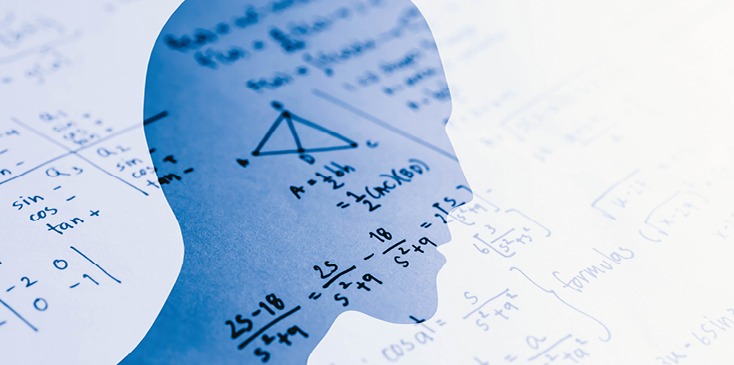If you have even the slightest bit of math anxiety, you might be wondering if numbers are involved in a bachelor in psychology online degree program.
One reason a math requirement could come as a surprise is because psychology is so often associated with qualitative things like emotions and feelings. Many psychologists and mental health professionals talk one-on-one with clients in clinical, healthcare, and educational settings and this intimacy seems very much the opposite of cold, hard numbers.
Rest assured, you can find psychology career options and a psychology undergraduate degree program that won’t involve mastering highly advanced math.
Math and Psychology: How Are They Connected?
When we take a big picture look at psychology, you can see how important math is to the study of the mind and behavior. For instance, through quantitative (numbers-based) research we can spot patterns, find connections, and make discoveries. Studying various aspects or attributes of a population can establish expectations or baselines that can be helpful in practice.
It might ease any math anxiety you have, though, to know that psychologists interested in more extensive professional or scholarly research typically continue into a master’s or Ph.D. program. This is where you’d find the more advanced studies in quantitative analysis, statistical methods in research, survey design, and other math-dependent courses. Among the subfields of psychology, you will even find some that specialize in math. Emerging fields, such as neuromarketing and artificial intelligence, also benefit from quantitative aspects of psychology.
What Math Classes Would I Take as a Psychology Undergraduate?
Most psychology undergraduate programs have a math requirement — but don’t let this deter you from pursuing an online psychology degree.
Even if the quantitative stuff — like statistical methods in research — isn’t necessary for your ideal position, a solid understanding of data — collecting, analyzing, and interpreting it — will be incredibly beneficial. This is why statistics is a common requirement in accredited psychology undergraduate programs. National University offers three online degrees in this discipline:
- Bachelor of Arts in Psychology
- Bachelor of Arts in Integrative Psychology
- Bachelor of Arts in Sport Psychology
A Probability and Statistics class is required in all of them. A basic grasp of algebra is beneficial for this and other research-related classes. In fact, to set you up for success in stats, National prefers you complete Algebra I and Algebra 2 first. (A passing grade on a placement test can also suffice.) To make you feel more confident about taking these introductory math classes at National, you should know that you won’t receive a letter or percentage grade — you only need to pass.
The Bachelor of Arts in Psychology also requires a psychological research course. In addition to covering the design of surveys and experiments, you’ll learn what to do with the findings and how to spot issues with your data.
The BA in Integrative Psychology is an alternative to the traditional, science-based undergraduate psychology degree, as it focuses more on the human condition and experience. The math requirement for this degree stops at probability and statistics. Instead, this online psychology degree focuses on qualitative research and analysis: this means studying through observation and experience rather than by crunching numbers.
The BA in Sport Psychology focuses on performance and motivation, and also does not require any official math/quantitative research courses outside of Statistics.
Finding Help for Math Anxiety
We’re using the term “math anxiety” here as a general term to describe discomfort with numbers and equations. Many, many people would say they’re not mathematical wizards, so don’t feel alone or discouraged.
Here are a few suggestions to help boost your math confidence:
- Learn the vocabulary so you become more comfortable with terms in the text.
- Don’t worry about memorizing formulas; in the real world, you’ll always be able to look them up.
- Ask questions in class (or privately outside of class).
- Math is learned by doing.
- Find additional study resources (either printed guides or online activities).
- Take advantage of on-site or online tutoring programs.
- Try positive self-talk; it could help change your long-held mindset that you’re “bad at math.”
Finally, if you’re an online psychology degree student at National University, you can remind yourself that each course lasts only four weeks. In a month’s time, you’ll have moved on to a new subject!
In today’s data-driven world, math and psychology may be more connected than ever. Still, you can succeed in this field without exceptionally strong math skills. Explore our psychology program page to find the degree option that best fits your career goals.
